 |

|
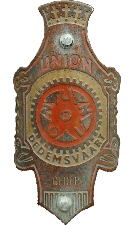 |
|
 |
| History |
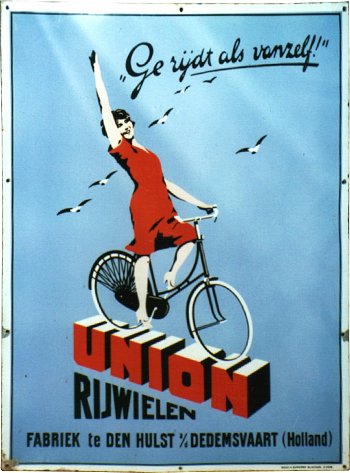 |
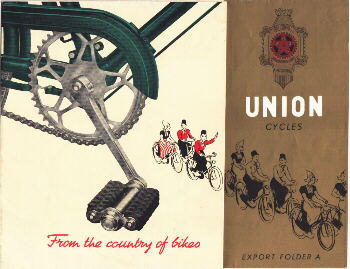
Union export brochure, c. 1954 |
Chronology

1904: Berend Jan van den Berg, a scion of a miller's family, establishes himself on 27 July
1904 in Den Hulst on the Dedemsvaart canal (municipality of Nieuwleusen) as a bicycle dealer and also
starts a trade in wood and building materials. He initially imports Orion and Möwe bicycles from Germany.
1906: The business expands to include a
wholesale business in bicycles and bicycle parts. J. van den Berg and E. van den Berg join as partners.
1911: Union starts manufacturing its own
bicycles. Initially, the frames are bought from Gazelle. Soon about 100
people work for Union.
1917: The Union catalogue of 1917 shows that
Union offers everything that a fully-fledged bicycle factory should be able to offer: various models of
men's and ladies' bicycles, racing bicycles, delivery bicycles, bicycles with groove ball bearings and
on request also bicycles in colour (grey-beige).
1920: The company is converted into a private limited
company, the Union Rijwielfabriek v.h. B.J. van den Berg. Bicycle production is at 3,000 units a year.
1936: After the death of E. van den Berg (1934)
and B.J. van den Berg (1936), B.J. van den Berg Jr. becomes managing director-president. Later, the two other
management positions are also taken over by the second Van den Berg generation. Union retained all three
business units for decades: bicycle factory, bicycle wholesaler and a building materials store. In addition,
household appliances are manufactured at Union after the war.
|
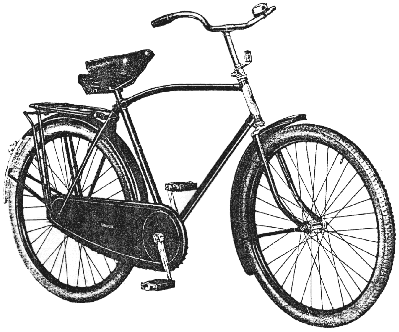 |
1939: Apart from the "Sport" model
that made its appearance among many bicycle manufacturers at the end of the 1930s, in the 1939 catalogue the
"Ballon" model with 26" balloon tyres stands out in particular. These bicycles are particularly suitable for
the bad roads in the countryside and are especially common in Germany in the 1930s. In the Netherlands,
there were only a few suppliers. |
1950: Union introduces the Union cross-frame bicycle. A year later, manufacture of mopeds starts. Only
the engine blocks are not made in-house.
1955: Union becomes a public limited company. The
building materials business is split off.
1964: As part of the emerging folding bike craze,
Union introduces the unconventional Strano. Not a real folding bike, but a two-wheeler only 55 cm long.
According to the trade magazine "Fietsenwereld" in 1963, the bicycle was an invention of Mr B.J.M.
Overing, who worked on its development for a year and a half. In Italy, however, this model was already known
in World War II under the name Velocino. And according to the 1931 English trade magazine "Cycling",
the origin of this bicycle was in Belgium. For Union, this bike was not a success, so sales were discontinued
as early as 1965.
|
|
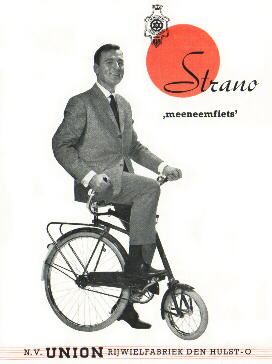
Union Strano leaflet, 1964
|
1966:
In September of 1966, Union produces its one-millionth bicycle, out of an annual production of 75,000
bicycles.
Shortly afterwards, Union announces a partnership with Kaptein of Amsterdam/Arnhem under the name
"Rijwiel- en Motorindustrie Unikap N.V.". At the time, Kaptein imported Motobécane's Mobylette
mopeds from France. In 1973, the partnership is dissolved, although Union maintaines the Unikap name until 1984.
In the 1960s, Union also produces bicycles under the Arizona and Savoy brand names.
1973: On 1 September, H.G. van den Berg steps down
as managing director of Unikap at the age of 62. After two generations, the company is now no longer run by
the Van den Berg family.
In the same year, the factory in Nieuwleusen is modernised and expanded. Powder coating is now used in the new
paint shop. The number of employees is around 300.
1976: A fire destroys Union's entire monumental front
building.
1992: Union is the first of the large Dutch manufacturers
to stop building its own frames and henceforth buys the frames from the subsidiary Janssen BV in Venlo, a frame
which, however, goes bankrupt after about five years.
1993: Union takes over the Rivel brand name from the
bicycle factory of the same name in Surhuisterveen. Rivel now becomes the cheaper version of Union brand
bicycles.
|

|
Difficult seventies and eighties

In the late 1970s, Union's annual production rose above 200,000 bicycles. But the company was not doing well.
Union had problems with the mighty Dutch bicycle cartel CBR, and it had problems with its own management.

The CBR (Centraal Bureau voor de Rijwielhandel) dominated the entire Dutch bicycle
industry from manufacturer to bicycle dealer for decades. Binding agreements were made, not only on prices but
also on who was allowed to do what and who was not. Deliveries to non-CBR members were out of the question.
Union repeatedly disregarded these rules in the late 1970s. Union bikes suddenly turned up at Dutch chain stores
like Makro and V & D for a lower price, and Union dealers felt duped. Union eventually exited
the CBR and then ran into trouble as it was boycotted by the industry. On the brink of the financial abyss,
Union crept back under the CBR roof with new leadership at the top. Union's reputation among the bicycle trade
was then tarnished for a long time.

The 1970s and 1980s were a difficult period for many bicycle factories. Union too
recorded heavy losses, but it stayed afloat. As it turned out, two executives had enriched themselves by illegally
siphoning money out of the company. But like a cat with seven lives, Union also survived these difficult years.

The "Volkskrant" newspaper summarised this period at Union in an article
of 10 September 1999 as follows:
|
The Union file is thick and full of stories of misery,
management changes, reorganisations, dumping practices, failed mergers, suspension of payments, managers
without vision and a sickened atmosphere on the shop floor. |
Union, incidentally, kept up the tradition of
unauthorised sales to third parties outside the cartel even longer: no other Dutch premium bicycle brand has
supplied so many bicycles to the "grey channel" (such as department stores) over the years. In
September 2001, retail organisation Euretco filed a lawsuit against Union, alleging that Union had supplied
Euretco-specified bicycles at a low price to cycle shop chain Megabike. The outcome: Euretco was allowed to
maintain the garnishment of outstanding payments to Union worth 790,000 guilders and the Euretco director was
allowed to continue openly claiming that Union was an "unreliable partner".
From hand to hand to Winning
Wheels

In the 1990s, Union languished further. The company was resold several times to new owners and again mostly
posted red figures.

In 1997, Rob van der Linden, owner of the Koch Kleeberg BV trading company,
became Union's largest shareholder. This made Union part of Van der Linden's Winning Wheels holding company,
which includes several companies in the two-wheeler industry. Under his leadership, a new direction was taken
at Union.
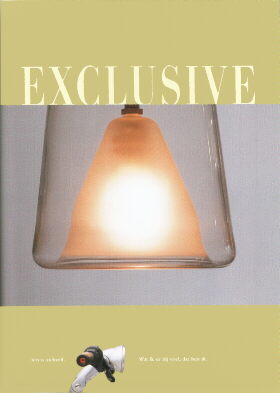 |
| Handsome advertisement with which Union advertised in full-page format
in 2001. Homely and stylish, but what kind of product is being advertised here and by whom? |
Image problem, renewal, bankruptcy,
restart

The Union brand has traditionally had the image of being a "bike for the common man or woman". It was
often sold in rural areas and suffered from a dull image. An image like Gazelle or Batavus was out of the question
for Union, perhaps also because Union was only a quarter of these leading companies in size.

Therefore, under Van der Linden's leadership, the expensive models were removed
from the range and Union underwent a facelift at the same time. Union was given a fancier image, targeting the
affluent public over forty. The development of the appealing "double easy" frame, a new variant of the
cross-frame bicycle, made Union stand out in the city bicycle segment in the 1990s.

But to no avail. Contrary to the new image, the factory in Nieuwleusen was severely
outdated. To the anger of the workforce, Van der Linden announced in September 2001 that the factory in the
province of Overijssel would be closed and transferred to the bulk bicycle manufacturer United Bicycles in
Maasmechelen, Belgium. Those who wanted to keep their jobs was offered to move the 300 km with them. Over a
month later, however, United Bicycles abandoned this plan for financial reasons. Union then offered itself to
the large bicycle manufacturer Accel (Batavus) in Heerenveen - without success. Subsequently, bankruptcy was
filed for Union by one of its suppliers. This culminated on 1 November in a moratorium and the appointment of
a trustee in Van der Linden's place. On 20 November, the bankruptcy became a fact.

There were a handful of candidates to take over (parts of) Union. In the end, the
trustee's surprising choice fell on the sheltered workshop Larcom from Ommen, which had been doing assembly work
for Union for many years and was a major creditor of Union. Larcom makes a restart with Union, taking over one
third of the old Union employees.
2003: Union's production moves to another, more
modern building in Nieuwleusen. Union tries to profile itself by - unlike its competitors - putting together
bicycles according to the customer's individual wishes. For production this proves to be a big challenge,
for sales figures it does not bring any increase.
2005: Union, which had been struggling for years in
terms of market share, is sold by Larcom to Dutch Bicycle Group (DBG) in Schiedam, a manufacturer of cheap
bicycles for DIY stores and chain shops. Only production remains in the hands of Larcom in Nieuwleusen for the
time being via a three-year contract. Sales no longer take place through its own dealer network but through
two selected channels, one of which is UK retail chain Halfords.

In fact, this is the end of Union as a bicycle manufacturer.
|
 |
|
|
Have you got an old Union bicycle?
Then add the bicycle to the bicycle database and get feedback
about your bike. For more information click here.
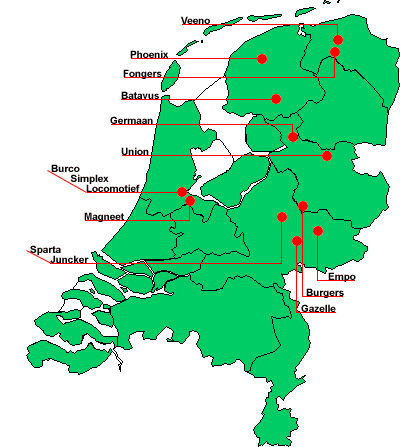
Copyright by
Herbert Kuner, © 2001 ...
All rights reserved.

Last update: 24/10/2023
|